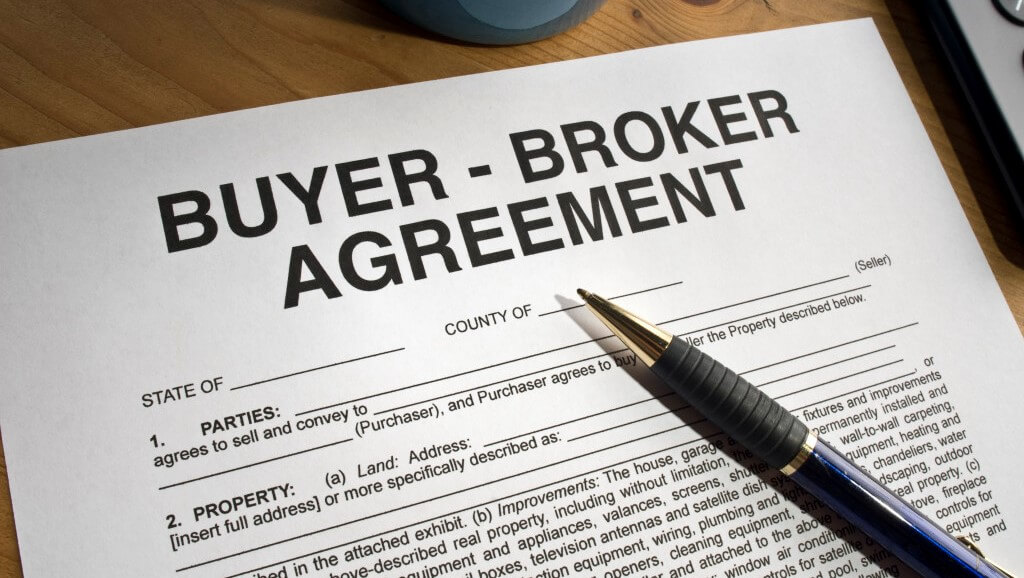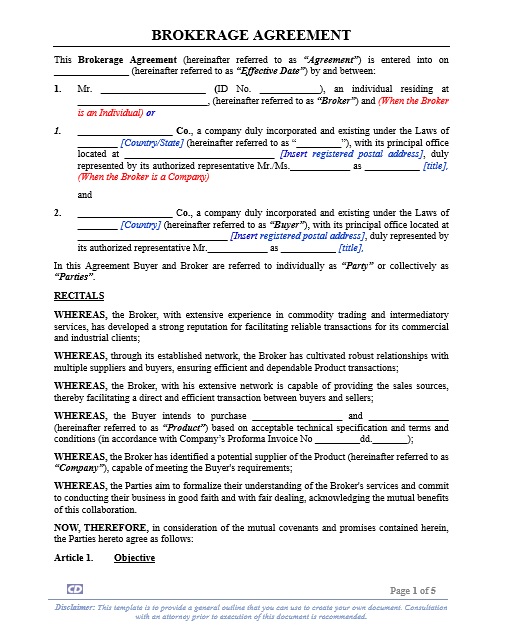Estimated reading time: 4 minutes
Introduction
A Brokerage Agreement sets the framework for cooperation between a Broker and a Buyer in commodity trading. It defines how the parties work together, how the Broker earns commission, and how each side protects its commercial interests. Because Buyers rely on timely sourcing, accurate pricing, and secure delivery, this agreement creates order and transparency throughout the procurement chain. It also reduces commercial risks through clear procedures on confidentiality, indemnification, and dispute settlement.

Purpose of a Brokerage Agreement
A Brokerage Agreement establishes the professional relationship between the parties. It clarifies that the Broker identifies suppliers, negotiates commercial terms, and supports the Buyer through each stage of the transaction. Moreover, it outlines payment arrangements, defines the commission basis, and confirms how the parties manage sensitive information. Because commodity trading often involves multiple jurisdictions, the agreement also includes jurisdiction, governing law, and enforcement clauses.
Core Elements of the Agreement
A well-designed Brokerage Agreement depends on a clear structure. First, it defines the products, quantities, and markets involved. Second, it confirms the Broker’s duties, including sourcing, negotiation, and coordination. Third, it specifies the Buyer’s responsibilities, such as providing accurate product specifications and issuing timely confirmations. Furthermore, the agreement states the commission mechanism, payment schedule, and situations where the Broker retains entitlement to fees. It also sets confidentiality obligations to protect commercial intelligence. Finally, it details indemnification, liability limits, and dispute resolution procedures to maintain stability if disagreements arise.
The Broker’s Function in Commodity Trading
Brokers strengthen the trading process by linking Buyers with reliable and competitive suppliers. They create value because they possess extensive market knowledge and maintain relationships across industries and regions. Their commercial intelligence helps Buyers choose the right option among many suppliers. Additionally, Brokers compare market prices, production capacity, delivery timelines, and financial stability before recommending suppliers. This adds significant efficiency and reduces procurement risk.
How Brokers Support Negotiation
Brokers negotiate commercial terms directly with suppliers. They discuss prices, minimum order quantities, Incoterms, payment conditions, documentation requirements, and delivery schedules. Because they understand supply-demand fluctuations, they secure realistic and competitive terms. Consequently, Buyers receive transactions that reflect accurate market value and reduced uncertainty. This negotiation support becomes especially important in volatile commodity markets, where prices move rapidly.
Logistics and Transaction Coordination
After the Buyer accepts the commercial terms, the Broker coordinates logistics. They communicate with freight forwarders, insurers, warehouse operators, and customs agents. They also ensure the flow of documents such as invoices, packing lists, certificates, and bills of lading. As a result, Buyers avoid delays and maintain compliance with import rules. This support allows Buyers to focus on their main business activities instead of dealing with shipment complexities.
Market Intelligence and Competitive Advantage
Brokers monitor global and regional market activity. They track price indexes, production trends, seasonal demand patterns, and regulatory changes. Consequently, Buyers benefit from early awareness of price risks, supply shortages, or suitable alternatives. Moreover, Brokers provide insights that guide procurement strategies, allowing Buyers to plan purchases, manage budgets, and remain competitive.
Why Brokerage Services Matter in Supply Chain Management
A Broker strengthens every link of the supply chain. They source the right suppliers, negotiate efficient terms, coordinate logistics, and provide strategic market updates. Because of this support, Buyers reduce procurement costs and avoid risks related to quality, timing, or compliance. Brokers, therefore, contribute to a more reliable, transparent, and resilient supply chain structure.
Conclusion
A Brokerage Agreement gives Buyers structured access to markets, suppliers, and commercial opportunities. It defines how the parties cooperate, how the Broker earns commission, and how both sides manage information and disputes. Additionally, the Broker’s role in sourcing, negotiation, logistics, and market intelligence significantly improves supply chain efficiency. For commodity Buyers who operate in competitive markets, a strong Brokerage Agreement ensures reliable procurement and long-term commercial stability.
Check out more pages of our website for related content:
- Intermediary Contract
- Commission Agreement
- Commission Payment Guarantee
- Purchase and Sale Contract (Commodity)
References:
- World Trade Organization (WTO) – “Trade Patterns and Global Value Chains in Commodities”
- United States International Trade Administration – “Commodity Trading and Supply Chain Guidance”
- World Economic Forum (WEF) – “Global Supply Chain Barriers Report”
has been added to your cart!
have been added to your cart!



